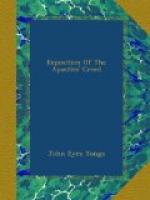He descended into hell; the third day He rose again from the dead
SECTION 1.—HE DESCENDED INTO HELL
It is somewhat startling to find in the Creed this statement regarding our Lord, “He descended into hell.” The clause, which was one of the latest admitted into the Creed, was derived from another creed known as that of Aquileia, compiled in the fourth century. It does not appear in the Nicene Creed, but it has a place in the Thirty-nine Articles of the Church of England, where we read, “As Christ died for us, and was buried, so also it is to be believed that He went down into Hell.” The Westminster Divines, who gave the Creed a place at the close of their Shorter Catechism, appended a note explanatory of the clause to this effect, “That is, continued in the state of the dead, and under the power of death, until the third day.”
The word “hell” is used in various senses in the Old Testament. Sometimes it means the grave, sometimes the abode of departed spirits irrespective of character, sometimes the place in which the wicked are punished.
In the English New Testament, also, the word “hell” has not in every place the same meaning. It represents two different nouns in the original Greek—Gehenna and Hades. Gehenna was the name of a deep, narrow valley, bordered by precipitous rocks, in the neighbourhood of Jerusalem, which had been desecrated by human sacrifices in the time of idolatrous kings, and afterwards became the depository of city refuse and of the offal of the temple sacrifices. The other noun, rendered by the same English word Hell, is Hades, which means “covered,” “unseen” or “hidden.” Hades is the abode of disembodied spirits until the resurrection. The Jews believed it to consist of two parts, one blissful, which they termed Paradise—the abode of the faithful; the other Gehenna, in which the wicked are retained for judgment. Lazarus and Dives were both in Hades, but separated from each other by an impassable gulf, the one in an abode of comfort, the other in a place of torment.[117]
As long as the spirit tabernacles in the body there are tokens of its presence in the visible life which is sustained through its union with the body. But when it departs from its dwelling-place in the flesh, death and corruption begin their work on the body. Death is complete only when the spirit has departed, and it is probable that this statement in the Creed was meant to express in the fullest terms that Christ’s death was real. As man He had taken to Himself a true body and a reasonable soul, and when His body was crucified and dead, His spirit passed, as other human spirits pass at death, into Hades. It is not without a meaning that we read, “When Jesus had cried with a loud voice, he gave up the ghost."[118] Ghost is simply spirit, and in His case, as in that of every man, there was a true departure of the soul from the body at death. It was with His spirit that His last thought in life was occupied. He knew that though it was to depart from the battered, bruised tabernacle of His body, it was not to pass out of His Father’s sight or His Father’s care. “Father, into thy hands I commend my spirit,"[119] were His last words on the cross.




